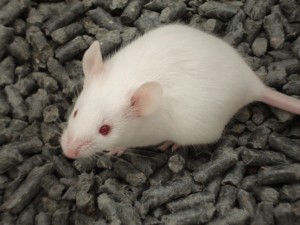By Ashley O’Neill (Contributor) – Email
Print Edition: Septemeber 18, 2013

We all have those moments where we hear a certain song and are reminded of some event that happened in our past. Well, now scientists are using this memory stimulus on mice to test how altering the brain chemically can create new memories, remember old ones, and erase unwanted ones.
In their experiment, Norman M. Weinberger, a research professor of neurobiology and behaviour at the University of California Irvine, and his team targeted the cerebral cortex of the rodents, the part of the brain responsible for memory, attention, thought, and consciousness, in hopes of creating sparks of new memories in their test subjects. They played a tone for the rodents while they manipulated the brain cells in the cortex with a chemical called acetylcholine (ACh).
ACh is an organic molecule found in many organisms, humans included, and acts as a neurotransmitter which helps us remember stuff. This chemical stimulating the brain’s nucleus basalis increased the number of brain cells that recognized the specific tone.
The next day, Weinberger and his team tested the mice in hopes of repeating the cognitive recognition they worked on the day before. This time they played many sounds and tones for the mice, as well as the tone they played the day before. The team found the mice did recognize the tone, after observing that respiration increased when the specific tone was played. This shows us that certain memories and feelings can be created and conjured up with the right stimulus in the cortical region of our brains.
Weinberger and his team have been working on the creation of new memories by combining parts of the brain linked to memory formation with ACh. He has high hopes for the implications of their findings.
“Disorders of learning and memory are a major issue facing many people, and since we’ve found not only a way that the brain makes memories, but how to create new memories with specific content, our hope is that our research will pave the way to prevent or resolve this global issue,” he told EurekAlert! earlier this month.
At the same time as Weinberger’s study was published, a study from the Scripps Research Institute in Jupiter, Florida published in Biological Psychiatry supports that we can also selectively erase memories caused by methamphetamine.
Neurobiologists observed the behaviour and brainwaves of mice and rats exposed to meth with various stimuli. Half the rodents were injected with a chemical that aids in the breakdown of actin protein filaments in the brain (treatment group) while the other rodents remained treatment free (control group) to compare results between the two groups.
The control group showed signs of meth-related memories when they were presented with one of the drug-related stimuli, but rodents in the treatment group did not respond to the stimuli. Mice without the treatment had considerably higher memory loss than the treatment group, but both groups responded the same to food rewards and (slight) electric shock therapy.
Study co-author and neurobiologist at the Scripps Research Institue, Courtney Miller hopes this technique can be refined to help rehabilitation patients recover from drug use by having unwanted and emotionally scarring memories removed.
“We are focused on understanding what makes [drug-related] memories different,” she said in a press release. “The hope is that our strategies may be applicable to other harmful memories, such as those that perpetuate smoking or PTSD [post-traumatic stress disorder].”
Between creating memories and deleting unwanted ones in mice, scientists are making big steps in understanding and manipulating the human brain – something Marvel’s Professor Xavier has been doing for years.

